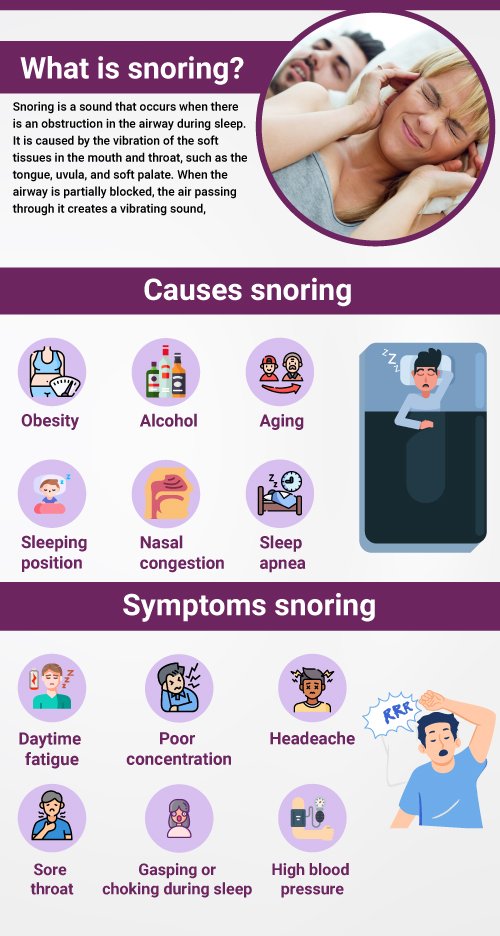Snoring is a common problem that affects many people and their partners. It can be caused by a variety of factors, including obesity, allergies, sleep apnea, or nasal congestion. Snoring can disrupt sleep and lead to daytime fatigue, irritability, and even health problems such as high blood pressure and heart disease. Treatment options for snoring range from lifestyle changes, such as losing weight or sleeping on your side, to medical interventions like surgery or using a continuous positive airway pressure (CPAP) machine. In this blog, we will explore the causes and symptoms of snoring and discuss the various treatment options available to help improve sleep quality and overall health.
What is snoring?
Snoring is a sound that occurs when there is an obstruction in the airway during sleep. It is caused by the vibration of the soft tissues in the mouth and throat, such as the tongue, uvula, and soft palate. When the airway is partially blocked, the air passing through it creates a vibrating sound, which can range from soft and mild to loud and disruptive. Snoring is a common problem that affects many people, and it can have a negative impact on the quality of sleep for both the snorer and their sleeping partner. It can also be a sign of a more serious underlying condition, such as sleep apnea, which requires medical attention.

Causes snoring
There are several causes of snoring, including:
- Obesity: Excess body weight can lead to the accumulation of fat in the neck area, which can put pressure on the airway and cause it to narrow, leading to snoring.
- Aging: As we age, the muscles in the throat can weaken, and the airway may become narrower, which can lead to snoring.
- Sleeping position: Sleeping on your back can cause the tongue and soft palate to collapse to the back of the throat, obstructing the airway and causing snoring.
- Alcohol and sedatives: These substances relax the muscles in the throat, leading to snoring.
- Nasal congestion: If the nasal passages are blocked due to allergies, a cold, or a sinus infection, it can force breathing through the mouth and cause snoring.
- Sleep apnea: A serious condition where breathing is repeatedly interrupted during sleep, leading to snoring and other health problems.
- Anatomy: Some people may have a naturally narrow airway, large tonsils, or a deviated septum, which can cause snoring.
It is essential to identify the underlying cause of snoring to determine the most effective treatment plan.
Symptoms snoring
The most obvious symptom of snoring is the loud, disruptive sound that occurs during sleep. Other symptoms may include:
- Daytime fatigue: Snoring can disrupt sleep, leading to daytime fatigue and irritability.
- Poor concentration: Lack of quality sleep due to snoring can affect concentration and cognitive function.
- Headaches: Snoring can cause headaches upon waking up in the morning.
- Sore throat: Snoring can cause the throat to become dry and irritated, leading to a sore throat.
- Gasping or choking during sleep: In severe cases, snoring can be a sign of sleep apnea, which can cause gasping or choking during sleep.
- High blood pressure: Prolonged snoring can lead to high blood pressure and other cardiovascular problems.
If snoring is affecting your quality of life or causing health problems, it is essential to speak with a healthcare provider to determine the underlying cause and appropriate treatment plan.
Heavy snoring
Heavy snoring is a more severe form of snoring that can be louder and more disruptive than regular snoring. It can be caused by the same factors as regular snoring, such as obesity, sleeping position, alcohol and sedatives, and nasal congestion. However, heavy snoring may also be a sign of a more serious condition called sleep apnea, where breathing is repeatedly interrupted during sleep.
If heavy snoring is disrupting your sleep or causing health problems, it is important to speak with a healthcare provider. They can conduct a sleep study to determine if you have sleep apnea or other underlying conditions that are contributing to snoring. Treatment options for heavy snoring may include lifestyle changes, such as losing weight or changing sleeping positions, or medical interventions like surgery or using a continuous positive airway pressure (CPAP) machine.
Snoring doctor
A healthcare provider who specializes in the treatment of snoring is called an otolaryngologist, also known as an ear, nose, and throat (ENT) doctor. Otolaryngologists are trained to identify the underlying causes of snoring and can offer a range of treatment options to help improve sleep quality and reduce snoring. They may conduct a physical exam, review medical history, and order diagnostic tests, such as a sleep study, to determine the severity and cause of snoring. Based on their findings, they may recommend lifestyle changes, such as losing weight or sleeping on your side, or medical interventions, such as using a continuous positive airway pressure (CPAP) machine or surgery. If you are experiencing snoring or other sleep-related problems, it is important to speak with a healthcare provider to determine the underlying cause and appropriate treatment plan.
Conclusion
In conclusion, snoring is a common condition that can be caused by a variety of factors, including obesity, aging, sleeping position, and nasal congestion. While occasional snoring may be harmless, heavy snoring can disrupt sleep and lead to serious health problems. If you are experiencing snoring or other sleep-related problems, it is important to speak with a healthcare provider to determine the underlying cause and appropriate treatment plan. Dr. Simple Bhadania is an experienced ENT specialist in Ahmedabad, who can offer a range of treatment options for snoring and other sleep-related problems. At ACE ENT Clinic, Dr. Simple Bhadania provides personalized care to help patients improve their sleep quality and overall health. If you are struggling with snoring, do not hesitate to schedule a consultation with Dr. SImple Bhadania to explore your treatment options.


